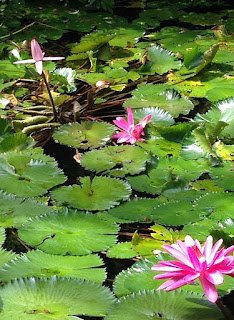Work hard today, for a better tomato
Sunday morning at a
bookshop? It seems like an age ago, in
fact it was the Queens Birthday last year.
The town was quiet as all souls are searching the wine regions for the
spirits of the party. A book launch was the order of the day. (It beat cleaning nine years of cafe off the
walls of Derailleur). With a prod from my wife to get
out of bed and fire up the coffee machine and a casual comment that there was a
talk going on in town about tomatoes. I’m in I say.
Karen Sutherland was
promoting the book, Tomato, she co-authored and self published
with Penny Woodward and Janice Sutton. Karen was talking at Booktique in
Wangaratta. I arrived 3 minutes late and
she was already in full flight. Talking about the need to talk about
soils. No really she wanted to talk about soils but there were other
things to talk about first. Like
Heirloom refers to vegetables and Heritage refers to fruit trees, and F1
hybrids - you can’t grow those from saved seed.
We got the lowdown on
Indeterminants and Determinants and Dwarf varieties. 220 varieties in the
book to be precise. Now I can’t give too
much away but there are a few Dwarf varieties that have been crossed with
heirloom plants to create plants for modern conditions. Think wicking
beds, straw bales, pots, bags and small gardens - those small spaces or for
people with reduced physicality.
We heard about tomato
varieties for hot weather, for cool, for shade and full sun. Varieties
with strong skins and pest resistance and those that just look good.
Now soil is where it
all happens. Are you prepared for the work or are you going to buy in
your nutrients? Hard work never killed any grower so let's get to it.
- Clear your area and make a weed tea or compost.
- Clay? Then spread some gypsum
- 25mm well-rotted cow manure then 50 mm of good compost
- A hand full or two of pelletized chicken manure per plant hole @ one plant per square meter
- Dig it in two shovels deep (I know I have lost you now - OK do what you can)
- A sprinkle of blood and bone
- Mulch with Lucerne, alfalfa or pea straw.
- Give them a liquid feed during flowering.
It’s pretty simple
when Karen put it like this. But I know that our beds have benefited from
some of this and I’ll try more this summer with the hope of a bumper tomato
saucing crop and jars and jars of passata for the year ahead.
The Farmers Markets
often have a share table so if you have a passion for a particular tomato
variety then share it there. Or create some extra punnets each year to
give as gifts. A bag of potting mix and
tomato all sorts punnet could bring the green thumb or competitive streak out
in your neighbours or friends. And it could build connections with them
on a whole new level. Our neighbour
Kevin likes to beat us to the first ripe tomato of the year. Thanks Kevin for your inspiration!
Really it’s also the
connections and stories that come with the plants and the seeds that interest
me. I was given tomatoes from Melissa and Donovan Jacka. The seeds were given to them from a local lady
who had carried the seeds from Italy when she was fifteen and coming to
Australia as a bride. Melissa gave these tomatoes to me with rules. “I only give them to you once” she
said. Learn to propagate them and grow them as you are not getting
more. It has motivated me to learn seed saving. Fermenting seeds to remove the outer gel
layer and to dry them twice - on a plate then on paper towel.
Last year I practiced the steps and read the book. But I think the investment in an encyclopaedia
of growing tomatoes in Australia will surely help. Now is the perfect time to read the book, prepare your soils, banana tea and save some seeds in readiness for the coming tomato season.
Thanks Karen for an
amazing resource and Michelle from Booktique for organising the talk. Here’s to a better Tomato!
“Work hard today, for
a better tomato!” - Quote from Karen Sutherland




Comments
Post a Comment